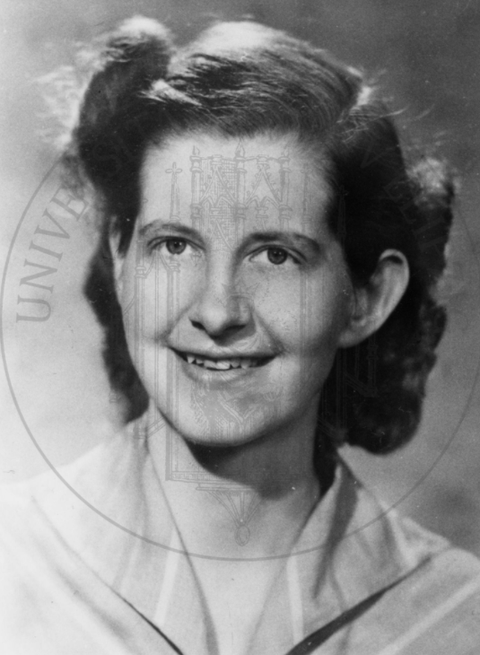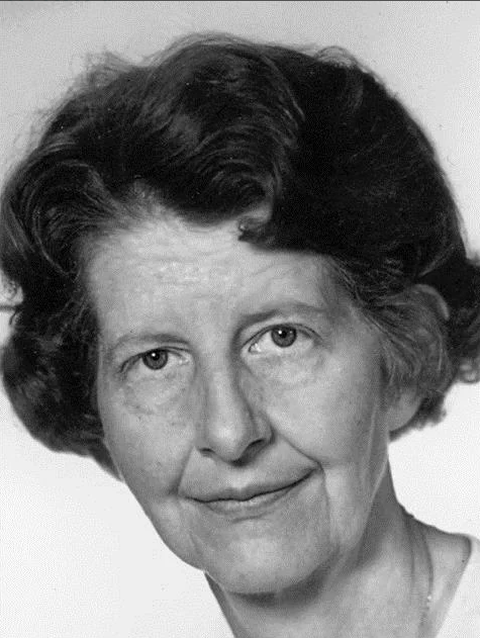Dr. rer. nat. Eleonore Trefftz

Ausweisbild aus ihrem Studierendenausweis der Uni Leipzig
Born: 15.08.1920, in: Aachen
Died: 22.10.2017, in: Munich
Faculty: Mathematics & Physics
Academic title: Dr rer. nat.
Eleonore Trefftz was born in Aachen in 1920. In 1923, the family moved to Dresden as her father Erich Trefftz, Professor of Technical Mechanics, had been appointed to Dresden Technical University. Eleonore Trefftz had four siblings, two brothers and two sisters. Eleonore attended the humanistic course at the Dresden-Neustadt girls' grammar school from autumn 1939. She was conscripted for military service and labour service.1 She received her school-leaving certificate at Easter 1940.
She studied mathematics and physics at the Dresden University of Technology from the summer of 1941, passed her intermediate diploma and continued her studies, particularly in theoretical physics in Leipzig, where she graduated with honours in October 1944 with a thesis on "Energy and magnetic moment of the one-dimensional crystal and energy of the two-dimensional square crystal". She then worked as an assistant to the physicist Friedrich Hund. Towards the end of the war, Eleonore Trefftz travelled back to Dresden to support her mother and siblings. Her eldest brother had been killed in the war. After the war, she moved back to Dresden and helped clear rubble at the Technical University, among other things. She was employed by Prof Hans Falkenhagen at the Institute for Theoretical Physics at the TH Dresden.
From 1 July 1945 she was a research assistant, and from January 1946 an assistant. Her dissertation was on the "Curie transformation of mixed crystals based on classical statistics". She submitted it to the Faculty of General Sciences at the THD. She was the first woman to complete her doctorate in Dresden after the Second World War and was awarded the title "Dr. rer. Nat.". Eleonore Trefftz began teaching in the winter semester of 1946/47 and held tutorials in theoretical physics. Eleonore Trefftz was instrumental in setting up the THD's Physics Practical Centre. In 1947, she was employed by the provisional administrator of the chair and, from autumn 1946, full professor Prof. Dr Martin Kersten.
Eleonore Trefftz moved to Göttingen in 1948 and worked at the Max Planck Institute for Physics there. Her research focused primarily on the theory of transition probabilities of spectral lines and their practical calculation, but also on the calculation of electron impact excitations and electron impact ionisation. She also headed the Quantum Mechanics research group. The Max Planck Institute for Physics moved to Munich in 1958 and Eleonore Trefftz moved with it.
In 1971, she was appointed a Scientific Member of the Max Planck Society, making her one of the first women to receive this honour and the first woman to become a Scientific Member of the Max Planck Institute for Physics and Astrophysics. She later became an Emeritus Scientific Member of the Max Planck Institute for Astrophysics in Garching. Between 1971 and her retirement in 1985, she was head of the "Department of Atomic and Molecular Physics".
Eleonore Trefftz learnt Russian in order to familiarise herself with thematically related research in Eastern Europe. She made working and study visits to the USA and Lithuania and spent several longer research stays at Kings College in London. Around 50 texts by Eleonore Trefftz have been published in Germany and abroad. Her work on the quantum theory of atoms and molecules as well as the theories and calculations of atomic data for the solar corona, stars and comets were groundbreaking and are still cited today.
Eleonore Trefftz always felt connected to the TUD. In 2002, Eleonore Trefftz took part in a conference of female physicists in Dresden to discuss the question of how talented young women could be encouraged to study physics. The TUD now has the Eleonore-Trefftz-Programm, which aims to specifically promote women in science.
Fußnoten
-
Although Eleonore Trefftz spent her youth and young adulthood as well as her education during National Socialism, there are no signs of her taking advantage of or criticising her activities and statements.

